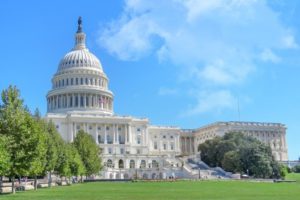
On January 6, 2021, thousands of people attended President Trump’s Save America rally in Washington D.C. to support his assertions that the 2020 Election was rigged and stolen. Afterwards, many of his supporters marched down Pennsylvania Avenue to the Capitol building where a joint session of Congress was convened to certify the Electoral College vote. Many in the crowd breached the barricades surrounding the building and entered in an attempt to prevent both houses from approving Joe Biden’s victory. The ensuring riot lasted for several hours while people occupied, vandalized and stole from the building. Eventually, the building was evacuated and locked down, but not before thousands of dollars in damage and five deaths occurred. Despite this attempt to disrupt the electoral process, Congress resumed session later that evening and certified the election for Joe Biden.
In the aftermath, the U.S. Attorney’s Office and the FBI began to identify and execute arrests for hundreds of people who were involved in the riots and committed criminal actions. Many perpetrators revealed their own identities by posting pictures of themselves on social media engaged in criminal activities. Among those was Richard Barnett of Gravette, Arkansas who became infamous for being photographed with his feet up on a desk in the Speaker of the House of Representative’s office. He later took some mail from the office and bragged to another protestor on video that he left a quarter on the desk because “I am not a thief”, although he also said she wasn’t worth it. He was arrested on January 8, 2021 and charged with, among other offenses, disorderly conduct on U.S. Capitol grounds.
40 U.S. Code § 5104(e) prohibits the following conduct at the U.S Capitol:
FIREARMS OR DANGEROUS WEAPONS: “An individual or group of individuals, except as authorized by regulations prescribed by the Capitol Police Board, may not carry on or have readily accessible to any individual on the Grounds or in any of the Capitol Buildings a firearm, a dangerous weapon, explosives, or an incendiary device; may not discharge a firearm or explosives, use a dangerous weapon, or ignite an incendiary device, on the Grounds or in any of the Capitol Buildings; or may not transport on the Grounds or in any of the Capitol Buildings explosives or an incendiary device, or may not knowingly, with force and violence, enter or remain on the floor of either House of Congress.” 40 U.S.C. §5104(e)(1).
A “dangerous weapon” includes “a device designed to expel or hurl a projectile capable of causing injury to individuals or property, a dagger, a dirk, a stiletto, and a knife having a blade over three inches in length.” 40 U.S.C. §5104(a)(2).
The penalty for violating 40 U.S.C. §5104(e)(1) is a felony conviction punishable by a fine or up to five years in prison, or both. 40 U.S.C. §5109(a).
VIOLENT ENTRY OR DISORDERLY CONDUCT: An individual or group of individuals may not willfully and knowingly:
- “[E]nter or remain on the floor of either House of Congress or in any cloakroom or lobby adjacent to that floor, in the Rayburn Room of the House of Representatives, or in the Marble Room of the Senate, unless authorized to do so pursuant to rules adopted, or an authorization given, by that House.” 40 U.S.C. §5104(e)(2)(A).
- “[E]nter or remain in the gallery of either House of Congress in violation of rules governing admission to the gallery adopted by that House or pursuant to an authorization given by that House.” 40 U.S.C. §5104(e)(2)(B).
- “[W]ith the intent to disrupt the orderly conduct of official business, enter or remain in a room in any of the Capitol Buildings set aside or designated for the use of either House of Congress or a Member, committee, officer, or employee of Congress, or either House of Congress, or the Library of Congress.” 40 U.S.C. §5104(e)(2)(C).
- “[U]tter loud, threatening, or abusive language, or engage in disorderly or disruptive conduct, at any place in the Grounds or in any of the Capitol Buildings with the intent to impede, disrupt, or disturb the orderly conduct of a session of Congress or either House of Congress, or the orderly conduct in that building of a hearing before, or any deliberations of, a committee of Congress or either House of Congress.” 40 U.S.C. §5104(e)(2)(D).
- “[O]bstruct, or impede passage through or within, the Grounds or any of the Capitol Buildings.” 40 U.S.C. §5104(e)(2)(E).
- “[E]ngage in an act of physical violence in the Grounds or any of the Capitol Buildings.” 40 U.S.C. §5104(e)(2)(F). An “act of physical violence” means any act involving an assault or other infliction or threat of infliction of death or bodily harm on an individual; or damage to, or destruction of, real or personal property.” S.C. §5104(a)(1).
- “[P]arade, demonstrate, or picket in any of the Capitol Buildings.” 40 U.S.C. §5104(e)(2)(G).
The penalty for violating 40 U.S.C. §5104(e)(2) is a misdemeanor conviction punishable by a fine or up to six months in prison, or both. 40 U.S.C. §5109(b).
This statute does not prohibit any act performed in the lawful discharge of official duties by a Member of Congress, his or her employee, or an officer or employer of Congress. 40 U.S.C. §5104(e)(3).
Richard Barnett and all of the other accused rioters charged are entitled to be presumed innocent until proven guilty. They are also entitled to have a skilled criminal defense lawyer in their corner to aggressively protect their rights, assert every defense available, and hold the prosecutor to the legal standard of proving guilt beyond a reasonable doubt. If you or a loved one is charged with any crime and need legal representation, then do not hesitate to contact the experienced attorneys at Kershaw, Vititoe & Jedinak PLC for assistance today.





